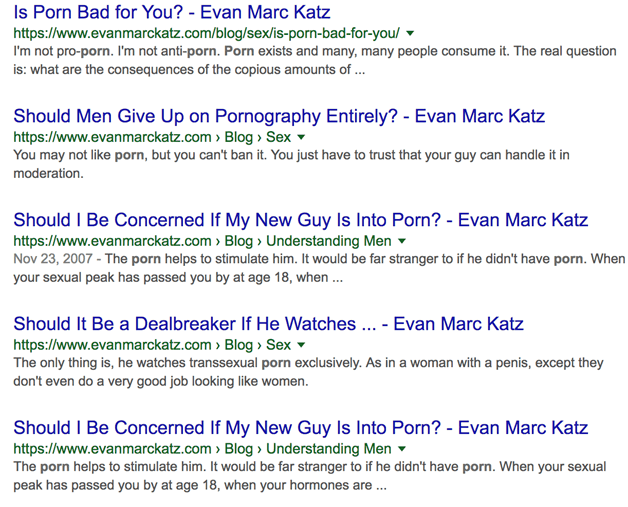[ad_1]
The debate rages on in this surprising Slate article from earlier this summer.
Can porn be addictive? Sure can.
But it’s not unique in that category. Not even close. Ask anyone whose relationship was wrecked by addictions to alcohol or cigarettes or video games or drugs or social media.
Vices are everywhere. It’s how you moderate them that matters. Some people have addictive personalities and must quit cold turkey. Others can manage their vices in small doses for their entire lives without causing a hint of trouble to them or their relationships.
Yet there’s a powerful public narrative that suggest that porn is somehow different — as if this one addiction is more destructive and toxic than the rest. I might suggest otherwise. If anything, what makes porn unique is that it’s about SEX, and that’s a topic that’s really hard for people to talk about without losing their minds. Basically, lots of people WANT porn to be stigmatized and banned.
“Scientists and clinicians who present evidence that challenges these harm-focused narratives–and we count ourselves among that group–face serious social and political opposition to their research. It can be tough for this info to make it to the public too. In his series How Not to F*ck Up Your Kids Too Bad, Stephen Marche described his experience as a journalist commissioned by two different outlets to write about the risks of pornography: When he could not find good evidence to demonize porn, “the editors killed it. What they wanted was to be scary.”
The first large, preregistered experiment found that viewing sexual pictures did not diminish love or desire for the current romantic partner.
As the photo above the article suggests, we’ve covered this ground extensively. And while I don’t think I’m going to change any anti-porn crusader with facts, I found the ones cited in the Slate piece to be pretty compelling.
“Amazingly, the first nationally representative peer-reviewed study on sex-film viewing was only just published in 2017 in Australia. This study found that 84 percent of men and 54 percent of women had ever viewed sexual material. Overall, 3.69 percent of men (144 of 3,923) and 0.65 percent of women (28 of 4,218) in the study believed that they were “addicted” to pornography, and only half of this group reported that using pornography had any negative impact on their lives…
Interestingly, even among the minority of users who believe they are “addicted” to pornography, remission may be spontaneous. A study following people over time found that 100 percent of women and 95 percent of men concerned about their frequent sexual behaviors (again, not assessed clinically) no longer felt that they were addicted to sex within five years despite no documented intervention.”
How about what porn does to a relationship? Well, the article makes a pretty fair point about porn use within a marriage.
“If your marriage is not going well or you stopped being intimate years ago, chances are good that someone in that relationship is masturbating to sate their unfulfilled sexual desire. This does not mean that masturbation (or the sex films you watch or the Fifty Shades of Greyhidden on your Kindle) caused your relationship to tank; rather, these coping mechanisms are more likely to be helping to hold your relationship together.”
And for all the folks who think that looking at porn is tantamount to cheating and indicative that your relationship is doomed: “The first large, preregistered experiment found that viewing sexual pictures did not diminish love or desire for the current romantic partner.”
Sorry, folks. Just like the majority of people can have a couple of drinks on the weekend without being alcoholics, the majority of people can masturbate to porn without destroying all that is sacred about marriage.
Your thoughts, below, are greatly appreciated.
[ad_2]
www.evanmarckatz.com







